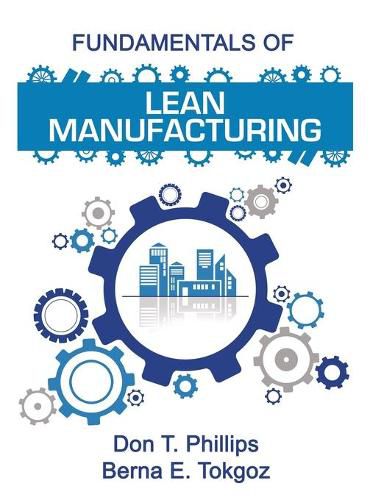Readings Newsletter
Become a Readings Member to make your shopping experience even easier.
Sign in or sign up for free!
You’re not far away from qualifying for FREE standard shipping within Australia
You’ve qualified for FREE standard shipping within Australia
The cart is loading…






This title is printed to order. This book may have been self-published. If so, we cannot guarantee the quality of the content. In the main most books will have gone through the editing process however some may not. We therefore suggest that you be aware of this before ordering this book. If in doubt check either the author or publisher’s details as we are unable to accept any returns unless they are faulty. Please contact us if you have any questions.
Modern Manufacturing Methodologies have undergone three different evolutionary stages over the past 200 years. Before there were modern manufacturing plants, the world only knew skilled craftsmen who labored as individuals in very small groups to produce goods and services. The first factory evolution came about when James Watt invented the steam engine. Metal cutting, forming and assembly machines were co-located near streams or rivers forming what we now call the Job Shop or the American Armory System. The second factory evolution began when Henry Ford introduced the first modern assembly line using interchangeable parts and standardized manufacturing procedures. This gave rise to the modern flow shop, which reached its zenith during WW II. In the late 1970’s, the third industrial evolution began when Taiichi Ohno and the Toyota Motor Company introduced what we now call Lean Manufacturing…and the world came. Over the last 30 years, all forms of manufacturing and service systems have embraced the concepts of Lean Thinking and proved its superiority to traditional manufacturing and service systems design.
This is a book which clearly explains the fundamental concepts of Lean Manufacturing, It also defines and characterizes a new breed of Manufacturing Engineer which we call the Lean Engineer. The Lean Engineer has roots in traditional Industrial engineering, but is also well trained in six-sigma methodologies and understands lean to green factory design principles. However, Lean Engineering transcends and redefines the classic Industrial engineer. Principles of Lean systems design, U-shaped Lean manufacturing cells, Linked Cell Manufacturing System design and Mixed Model final assembly lines are unique Lean Engineering strategies. This book attempts to define the Fundamentals of Lean Manufacturing and Introduces Lean System Design principles.
Demonstrates the conversion of traditional manufacturing lines into U-shaped Lean Cells
Contrasts push versus pull manufacturing strategies
Covers Balancing, Leveling and System synchronization
Describes and gives examples of Single and dual card Kanban Systems
Discusses the Role of Maintenance, Reliability and Quality Assurance in Lean Manufacturing
Includes over 150 Homework questions or problems and two comprehensive case studies
This book serves as a college textbook for any Introductory Lean Manufacturing course for Industrial Engineering, Mechanical Engineering, Engineering Technology or Business Course. It is also an excellent reference book for Industrial Manufacturing Engineers who wish to implement Lean Concepts and Lean Thinking.
$9.00 standard shipping within Australia
FREE standard shipping within Australia for orders over $100.00
Express & International shipping calculated at checkout
This title is printed to order. This book may have been self-published. If so, we cannot guarantee the quality of the content. In the main most books will have gone through the editing process however some may not. We therefore suggest that you be aware of this before ordering this book. If in doubt check either the author or publisher’s details as we are unable to accept any returns unless they are faulty. Please contact us if you have any questions.
Modern Manufacturing Methodologies have undergone three different evolutionary stages over the past 200 years. Before there were modern manufacturing plants, the world only knew skilled craftsmen who labored as individuals in very small groups to produce goods and services. The first factory evolution came about when James Watt invented the steam engine. Metal cutting, forming and assembly machines were co-located near streams or rivers forming what we now call the Job Shop or the American Armory System. The second factory evolution began when Henry Ford introduced the first modern assembly line using interchangeable parts and standardized manufacturing procedures. This gave rise to the modern flow shop, which reached its zenith during WW II. In the late 1970’s, the third industrial evolution began when Taiichi Ohno and the Toyota Motor Company introduced what we now call Lean Manufacturing…and the world came. Over the last 30 years, all forms of manufacturing and service systems have embraced the concepts of Lean Thinking and proved its superiority to traditional manufacturing and service systems design.
This is a book which clearly explains the fundamental concepts of Lean Manufacturing, It also defines and characterizes a new breed of Manufacturing Engineer which we call the Lean Engineer. The Lean Engineer has roots in traditional Industrial engineering, but is also well trained in six-sigma methodologies and understands lean to green factory design principles. However, Lean Engineering transcends and redefines the classic Industrial engineer. Principles of Lean systems design, U-shaped Lean manufacturing cells, Linked Cell Manufacturing System design and Mixed Model final assembly lines are unique Lean Engineering strategies. This book attempts to define the Fundamentals of Lean Manufacturing and Introduces Lean System Design principles.
Demonstrates the conversion of traditional manufacturing lines into U-shaped Lean Cells
Contrasts push versus pull manufacturing strategies
Covers Balancing, Leveling and System synchronization
Describes and gives examples of Single and dual card Kanban Systems
Discusses the Role of Maintenance, Reliability and Quality Assurance in Lean Manufacturing
Includes over 150 Homework questions or problems and two comprehensive case studies
This book serves as a college textbook for any Introductory Lean Manufacturing course for Industrial Engineering, Mechanical Engineering, Engineering Technology or Business Course. It is also an excellent reference book for Industrial Manufacturing Engineers who wish to implement Lean Concepts and Lean Thinking.